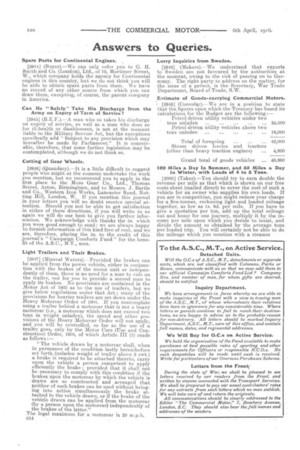Answers to Queries.
Page 20

If you've noticed an error in this article please click here to report it so we can fix it.
Spare Parts for Continental Engines. , [2944] (Buyer).—We can only refer you to G. H. Smith and Co. (London), Ltd., of 12, Mortimer Street, W,,. which company holds the agency for Continental engines in this country, but we do not think you will be able to obtain spare parts from them. We have no record of any other source from which you can draw them, excepting, of course, the parent company in America.
Can He "Safely" Take His Discharge from the Army on Expiry of Term of Servicir?
[2945] (B.E.F.).--A man who so takes his discharge Ott expiry of service, as well as a man who does so for ill-health or disablement, is not at the moment liable to the Military Service Act., but the exceptions specifically add "Subject to any provision which may hereafter be made by Parliament."It is conceivable, therefore, that some further legislation may be contemplated, although we do not think so.
Cutting of Gear Wheels.
[2946] (Quandary).—It is a little difficult to suggest people who might at the moment undertake the work you mention, but we recommend you to apply in the first place to the Moss Gear Co., Ltd., Thomas Street, Aston Birmingham, and to Messrs. J. Bartle and Co., Western Iron Works, Lancaster Road, Notting Hill, London, W. If you mention this journal in your letters you Will no doubt receive special attention. Should you not be able to get satisfaction in either of these directions, if you will write to us again we will do our best to give you further information. We acknowledge with thanks the 5s. which you were good -enough to send: we are always happy to furnish information of this kind free of cost, and we are, therefore, placing the 5s. to the credit of this journal's "-Campaign Comforts Fund" for the benefit of the A.S.C., M.T., men.
Light Trailers and Their Brakes.
[2947] (Mineral Waters).—Provided the brakes can be applied from the power vehicle' either in conjunction with the brakes of the motor unit or independently of them, there is no need for a man to ride on the trailer, nor for you to provide a second man to apply its brakes. No provisions are contained in the Motor Act of 1903 as to the use of trailers, but we give below regulations under that Act.; many of the provisions for heavier trailers are set down under the Heavy Motorcar Order of 1904. If you contemplate using a trailer behind a motorcar that is not a heavy motorcar (i.e., a motorcar which does not exceed two tons in weight unladen), the speed arid other provisions of the Heavy Motorcar Order will not apply, and you will be controlled, so far as the use of a traiier goes, only by the Motor Cars (Use and Construction) Order, 1904, of which Article III (3) reads as follows :— `.` The vehicle drawn by a motorcar shall, when in pursuance of the condition lastly hereinbcfore set forth.(untaden weight of trailer above 2 cwt.) a brake is required to be attached thereto, carry upon the vehicle a person competent to apply efficiently the brake ; provided that it shall not be necessary to comply with this condition if the brakes upon the motorcar by which the vehicle is drawn are so constructed and arranged that neither of sueb.ihrakes can be used without bringing into action simultaneously the brake attached to the vehicle drawn, or if the brake of the vehicle drawn can be applied from the motorcar (by a person upon the motorcar) independently of the brakes of the latter."
The legal maximum for a motorcar is 20 m.p.h. 054 Lorry Inquiries from Sweden.
[2948] (Makers).—We understand that exports to Sweden are not favoured by the authorities at the moment, owing to the risk of passing on to Germany. The right party to address on the matter, for the issue of a permit, is the Secretary, War Trade Department, Board of Trade, S.W.
Estimate of Goods-carrying Commercial Motors.
; [2949] (Consular).--We are in a position to state that the figures upon which the Treasury has based its calculations for the Budget are the following:— Petrol driven utility.vehicles under two
tons unladen ...... 24.000 Petrol-driven utility vehicles above two
tons unladen ... ... 18,000 Total of foregoing 42,000 Steam driven lorries and tractors (other than heavy traction engines) ... 4,800 Grand total of goods vehicles ... 46,800 100 Miles a Day In Summer, and 50 Miles a Day In Winter, with Loads of 4 to 5 Tons.
[2950] (Taker).—You should try to earn double the revenue per mile as that which is shown on our free costs-sheet (mailed direct) to cover the cost of such a vehicle for an owner who supplies his own loads. If you are in competition, you might reduce your charge for a five-tonner, reckoning light and loaded mileage together, as low as is. 8d. per mile. If you have to give a quotation per ton, add up the total mileage out and home for one journey, multiply it by the income per mile upon which you decide• to insist., and divide the amount so obtained by the average tons: per loaded trip. You will certainly not be able to do the mileage which you mention with a steamer






















